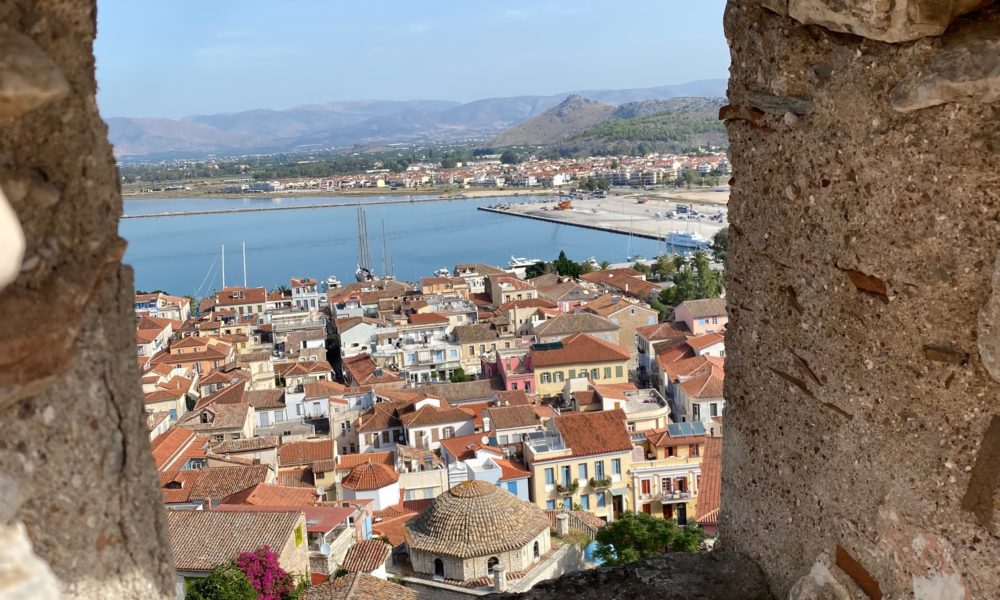
Nafplio wins by closer acquaintance
37° 34′ 5.448” N 22° 48′ 31.1796” E
3th october
Seen from the sea, the old castle town of Nafplio does not look special at all. The three Venetian fortifications do make their marks on the city, but otherwise what we see is just huge parking lots around a harbor surrounded by wire fences and a harbor that is completely without amenities like electricity and water. A totally boring port.
However, when you move into the streets of the city, you are overwhelmed by the liveliness and the beautiful buildings – Venetian, Turkish, Greek – all built charmingly together with the Venetian fortifications. You sense the greatness of the past and you do understand that here is the leading city of the area, with a past as the capital of Greece for a few years in19th century.
But the port itself is probably the most boring and inhospitable port in all of The Saronic Sea, and after two nights we sail south again. The most exciting thing about the harbor is, that we – as apparently the only boat – are subjected to a thorough police inspection, where the officers are particularly interested, whether we have paid our sailing tax.
We have. And thus we have saved a fine of 500 Euro.
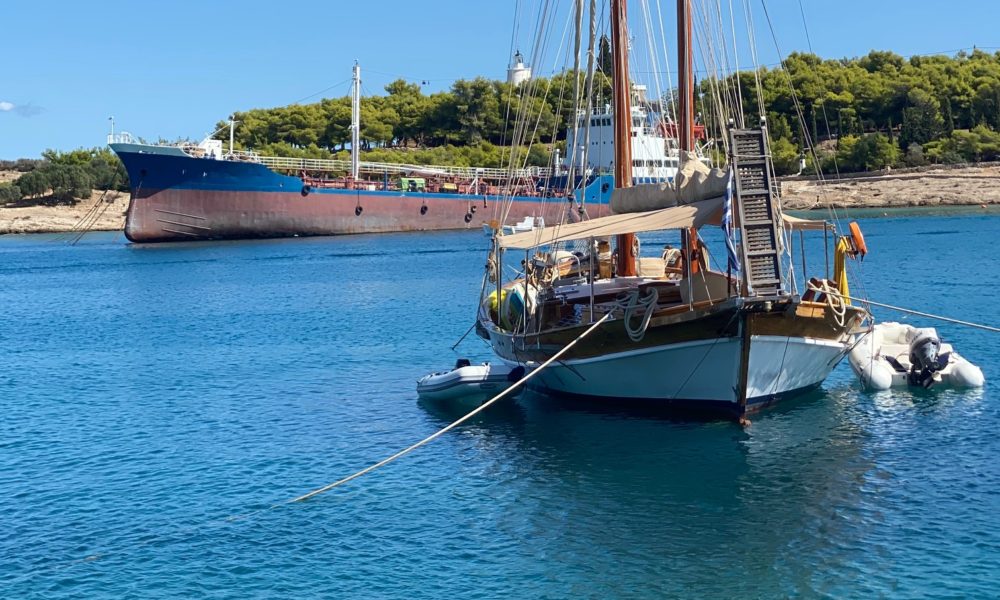
Among the jet set on the Greek Riviera
37° 16′ 6.9600” N 23° 9′ 15.2640” E
1th october 2020
By pure chance, we find a berth in Spetzai’s old, plug-stopped but intensely charming harbor, where the inner harbor is occupied by several layers of local small boats, especially wooden dinghies, a couple of large motorboats and a lot of water taxis that have gone into hibernation during the corona descent and low season.
The outer harbor is occupied by a cargo ship, anchoring for better times, and some huge luxury yachts mooring, while highlighting themselves with floodlights on the mast, hull and the water around, so that all the rest of us can understand that some very special people are living on this ship.
We find a humble place at the northern end of the inner harbor where small primitive shipyards preserve the ancient craftsmanship of boatbuilding. They build the most beautiful boats.
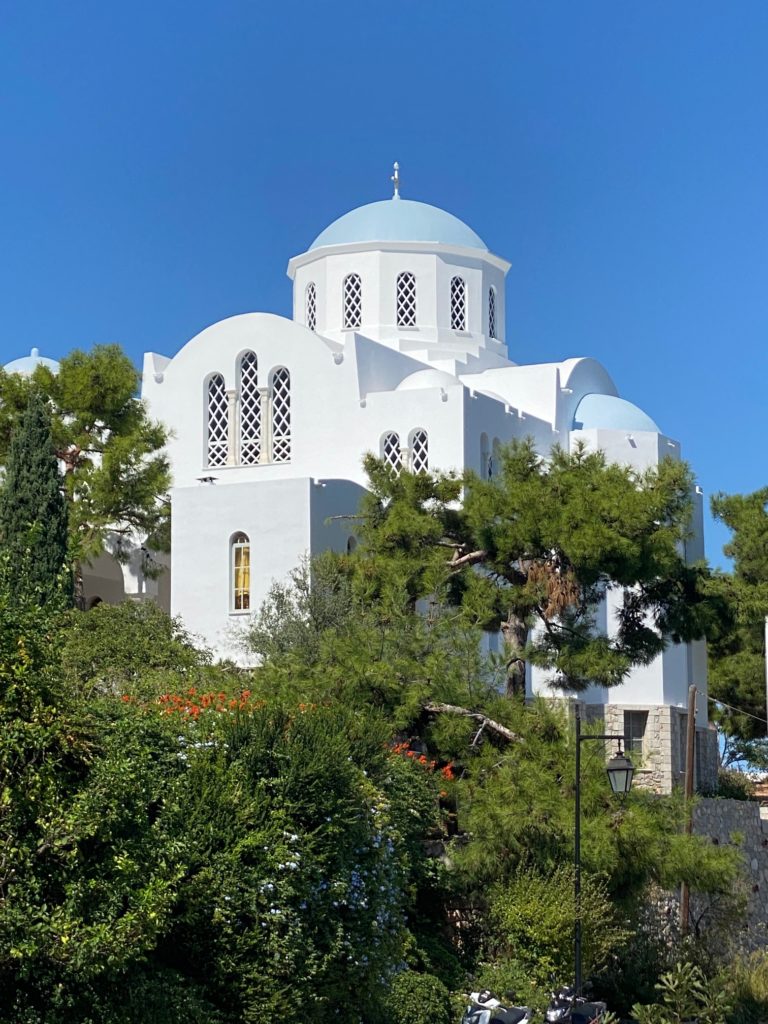
Spetzai (the Greeks call the island Spetses) is part of what is being marketed as the Greek Riviera. They have a long way to go yet, but Spetzai IS beautiful, characterized by rich buildings from a time when Spetzai was strong in the area’s commercial life. The island is officially car-free, but is in turn filled with noisy and stinking motorcycles as well as – considering the island’s car-free status – quite a few cars.
It is a wildly beautiful island. It is lower than the average greek island and massively grown with pine trees. We rent two electric bikes and tramples round all the island’s 26 kilometers of asphalt, we pass beautiful beaches, ex-King Constantine and Anne Marie’s big summer residence and we enjoy the magnificent nature. Fantastic experience.
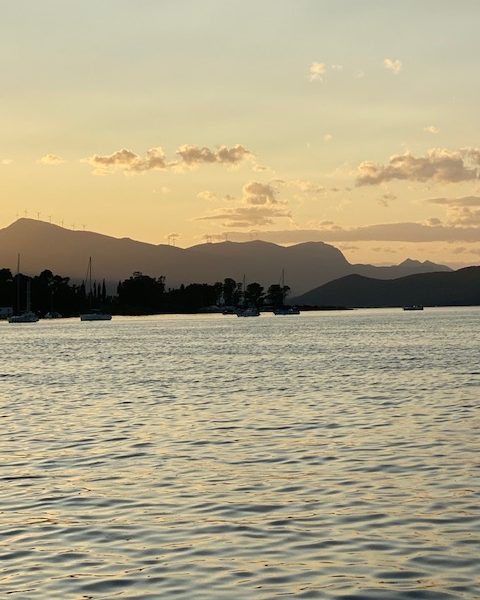
Please, let us pay our taxes
37° 30′ 16.8372” N 23° 27′ 40.0716” E
28th september 2020
“My job is not to help you. My job is to give you a fine, if you have not paid your taxes.”
The policeman is extremely unpleasant. First, he throws us out of an office with a sign saying Port Police on the door. Obviously, it is not meant for ordinary citizens to walk through that door. Later, he explains to us out in the hallway, that we must solve our problems ourselves. His job is to give us fines.
All we want is to pay our taxes.
Greece has introduced a sailing tax, called eTepai, which for our sailing boat amounts to 33 € for each month it is sailing in Greek waters.
We actually thought, we had paid the tax from home over the internet, where we had filled out forms and transferred money from our bank to the Greek state. But after a few days, the money comes back without any explanation. Now that we’re in Greece again, we’re trying to find another way to pay our taxes.
At first, we go to a branch of the National Bank of Greece. No. That kind of thing they will have nothing to do with. “Try in the city’s other bank, Alpha Bank, they have a machine that can handle those kinds of payments,” one of the bank’s employees tells us.
In the city’s second bank, Alpha Bank, they know nothing about this. We can ‘t transfers our money in their bank.
And then we end up with the port police. “Could you please tell us, where we can pay our sailing taxes?”
Well, they could not.
Then we go into a store that advertises that they make any kind of money transfer worldwide. Well, except ours. “There is no possibility, that you can transfer this money through us,” says the clerk.
Now only the post office is left. We line up with a number of other citizens. And, when it’s our turn, the miracle happens: The post office can handle our money. The money is transferred. We are again law-abiding sailors, who can walk past the harbor police with a straight back, while in our quiet minds we think, that it is so odd, that in this country an authority figure can’t be an executive police authority and at the same time acting accommodating and helpful.
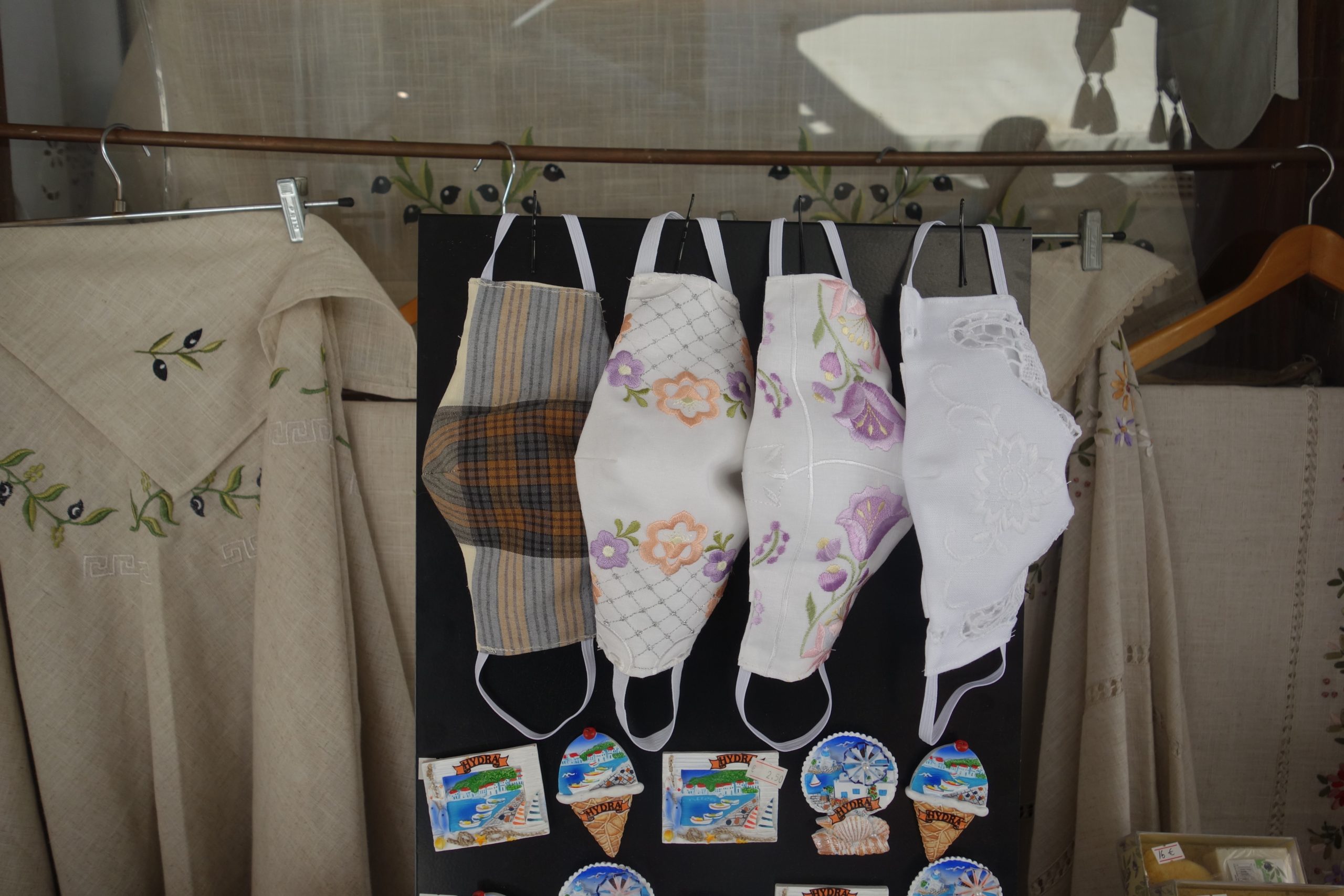
In Greece you are very serious on Covid-19
37° 29′ 50.3988” N 23° 27′ 29.322” E
September 8, 2020
We sail back to Poros, as it turns out that our consumer batteries are still not quite ok. A battery is replaced by our regular mechanic / electrician / specialist. It helps.
We spend a few days enjoying the excellent beaches of Poros and studying the city life of Poros town. It is interesting to see how consistently the Greeks handle the corona situation. In each of the city’s 65 cafés, staff wear facemasks and hand alcohol on the tables. If you walk into a store, you will be asked to put on a facemask, and on the beach you will be warned not to move your sunbed closer to your spouse. “One meters distance. Basta. ” But actually we do understand it. Nearly 20 percent of Greeks work in the tourism industry. A total shutdown will really hurt.
In the harbor we meet a Canadian couple who have been in self-selected corona quarantine on their sailboat for half a year. Food, drink and medicine are brought to the boat. The couple themselves spend time to feed the city’s cats and chase away other sailors, who are trying to berth their boats too close to their self-proclaimed quarantine station. They will continue to Tunisia, Gran Canaria and then across the Atlantic in November. “We’re leaving tomorrow,” they tell us every day throughout the week. When we ourselves leave Poros, they are still there.
We make an arrangement with our friend in Vikos Marineshop, that he will look after Ronja, while we are at home in Denmark for the next 10 days.
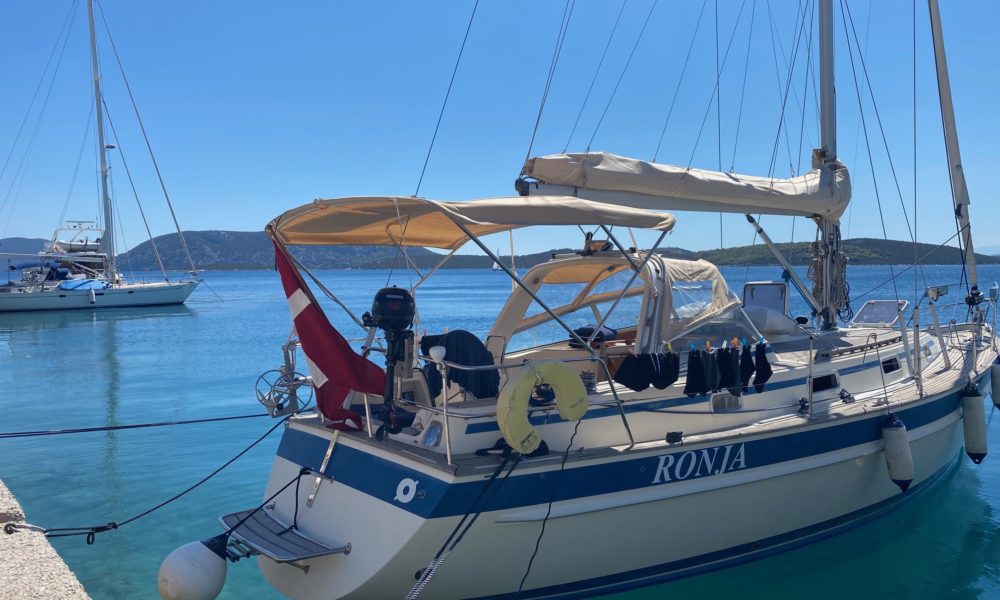
Close to falling in
37° 20′ 46.6044” N 23° 14′ 44.016” E
September 4, 2020
Happy that the hassle is over, we sail further south and call at Ermioni in the Peloponnese.
We are still not thrilled with the Greeks’ tradition of berthing “backwards” to the quay. Often the distance between the boat and the quay becomes too great, and when we went ashore in the evening, Kirsten’s jump only reaches half the distance (her dress was probably too tight :-). Fortunately, Per has a good grip on her arm and mitigates a fall into the water. Relieved and only slightly bruised, we continue up into the city.
Ermioni turns out to be a gem. We find a wonderful walk around a peninsula with beautiful views, cicadas and a massive scent of pine trees.
From Ermonia we take a water taxi to the island of Idrhá.
Idrhá is also a gem, but a very touristy and busy gem. We are glad, that we did not sail to the island ourselves, because the harbor is a huge chaos of water taxis, ferries, fisher boats and yachts, all of them trying to find space in the small overburdened harbor.
Idrhá is car-free, and the street scene is – in addition to tourists – characterized by donkeys dragging groceries home from the supermarket. Truly a beautiful and charming town.
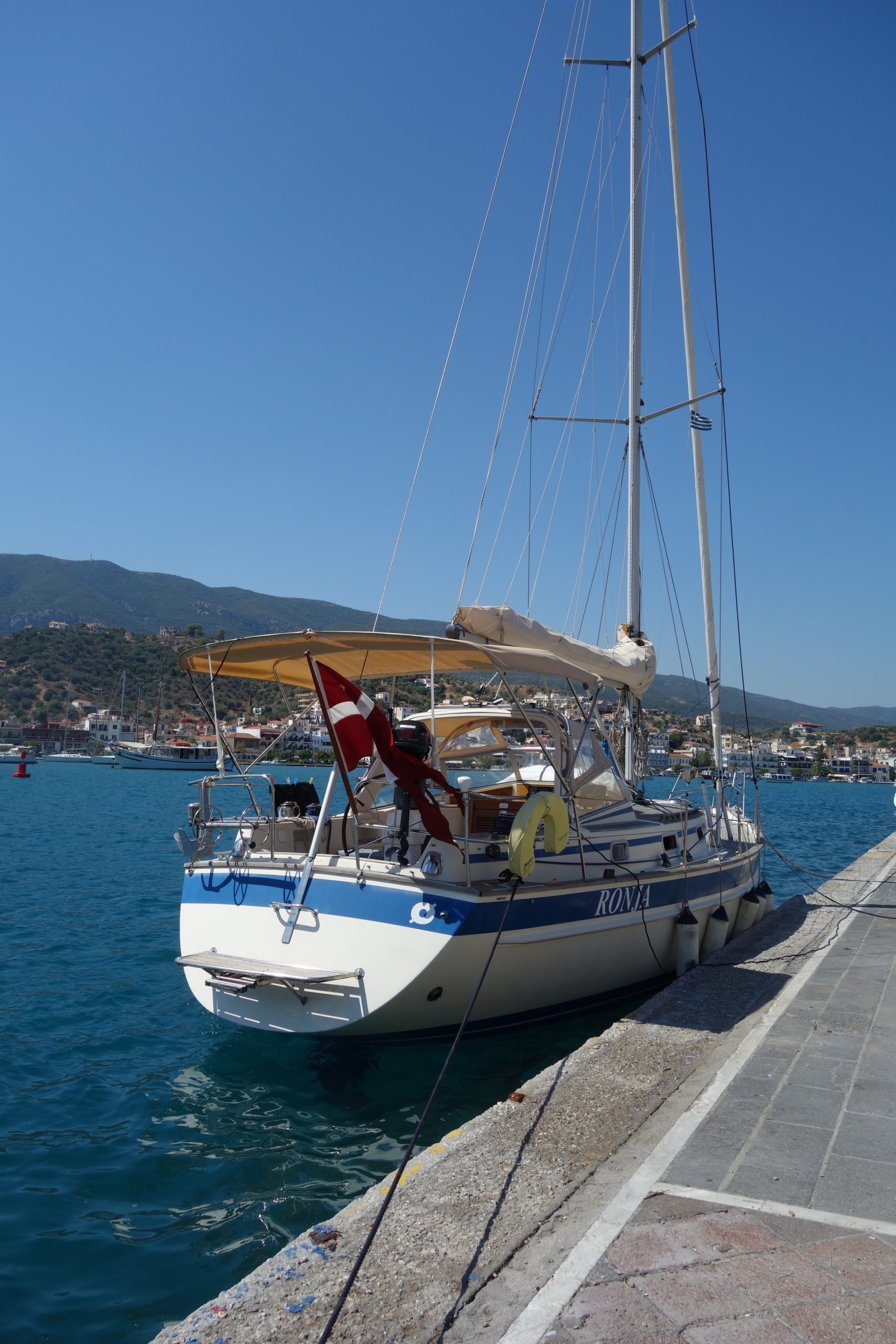
Elderly lady with starting problems
37° 29′ 50.3988” N 23° 27′ 29.322” E
We sail south to the island of Poros and find a place alongside right in the center of town. Poros is a lively city, a mecca for sailors, beautifully situated in a narrow strait between Poros and the Peloponnese.
And now the hassle begins. It turns out that fourteen months without care leaves its marks on a boat. It takes time to get Ronja up to speed. She is after all an elderly lady, and she has problems with starting, problems with the toilet problems and problems with the battery.
Fortunately, Poros has two excellent marine stores. One sends us a plumber to repair the toilet. The other sends us a mechanic to check the motor and later an electrician (who turns out to be identical with the mechanic) to fix our battery system.
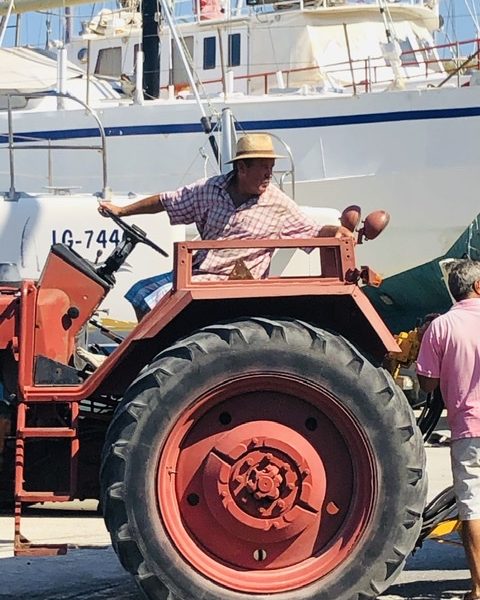
Sailing again – after 14 months pause
37° 46′ 5.779” N 23° 27′ 6.4908” E
Excited, we arrive Sunday night at Asprakis Boatyard on the north side of the island of Aegina, just south of Athens. Here, Ronja has been standing ashore for no less than 14 months. When the period has become so long, it was because Per had to undergo preventive cancer surgery – and then later, when we in March had our suitcases packed, COVID-19 closed all of Europe’s borders one by one.
Finally we are here. How has Ronja fared?
Apparently fine. The ship yard had washed her, changed the oil on the engine and mounted sails and bimini. Happy we go to bed in the awareness that tomorrow we will go sailing.
Fortunately, this IS the case, but first we have to call an electrician to repair the refrigerator, and later we have to have a mechanic kickstart the engine.
Finally at sea. Gregory Asprakis takes a fair price for storing the boat (120 € for summer months, 130 € for winter months), however his price is high, if you ask him to do repairs or extra services.